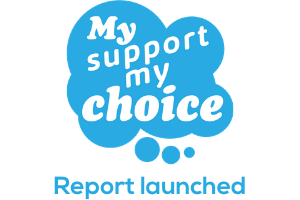Experiences of SDS in Highland
Self Directed Support Scotland (SDSS) and the Health and Social Care Alliance Scotland (the ALLIANCE) have published their latest ‘My Support, My Choice’ report, exploring the experiences of people who access or wish to access Self-directed Support (SDS) in Highland.
This report is part of a suite of Local Authority reports collated during the largest direct consultation of SDS to date – My Support, My Choice: User Experiences of Self-directed Support in Scotland (MSMC). The research also resulted in a separate suite of thematic reports exploring the experiences of people with learning disabilities, Black and minority ethnic people, people with lived experience of mental health problems, blind and partially sighted people, and women as users of SDS.
The national report and the five thematic reports have been quoted in the Independent Review of Adult Social Care, and provided key evidence for Social Work Scotland’s trialling of the new Self-directed Support (SDS) Standards.
My Support My Choice: People’s Experiences of Self-directed Support and Social Care in Highland highlights evidence of good practice and where improvements can be made. We hope it can assist in the strategic planning and delivery of future SDS/ social care in Highland – particularly regarding the development and local implementation of the National Care Service.
People in Highland generally reported that SDS had improved their social care experience and have shared examples of good practice from across the region, particularly about good conversations and relationships with social work professionals, and involvement in care decisions. However, as the research highlights, there are key areas where improvements could be made to respond to people’s concerns and increase the effectiveness and reach of positive SDS experiences.
The views expressed by research participants and analysis of the findings have led to a number of recommendations, many of which echo other independent reviews of SDS:
- People need good access to publicly available, high quality information about SDS/ social care, in a range of accessible and tailored formats.
- Sufficient time must be allocated for needs assessments and review meetings, to allow for detailed questions and consideration of the four SDS options.
- Further information and training for professionals may be required about the SDS options and supported decision making.
- Local authorities and health and social care partnerships should work with people who access SDS and unpaid carers to improve systems and processes related to care staff recruitment, training and quality, including diversification of the workforce.
- Local peer networks should be encouraged and supported.
The report also includes a response from Highland Health and Care Partnership, who said:
“Highland Health and Social Care Partnership (HHSCP) welcome the publication of this report into supported people’s experience of Self- Directed Support (SDS) in Highland. HHSCP will review the report and its findings to inform important redesign and development work going forward.”
The My Support My Choice research publications conclude with the publication of the Highland and, as with each Local Authority we worked with in this project, we note the Highland Health and Social Care Partnership’s commitment to improvement, collaboration and community led approaches, saying:
“In January of this year the Health and Social Care Committee agreed the SDS Strategy for Adult Services and we are now embarking on the important work of realising it and continuing with the collaborative approach that we have adopted to date. This work is progressing alongside other important related initiatives such as the development of Community Led Support.”
If you have any questions about the research, please email Dr Hannah Tweed, Senior Policy Officer at the ALLIANCE (hannah.tweed@alliance-scotland.org.uk) or Mark Han-Johnson, Membership Development Executive at SDSS (mark@sdsscotland.org.uk).



